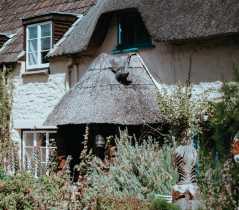
We went out the door, wrapped in coats and scarves, with our paper lanterns lit. The streets were dark, but ahead of us, we could make out the shadows of other children and their parents, their faces softly illuminated by their own lanterns hung on sticks. The lanterns swayed gently as we walked. We went up the street, up the long hill, through the little Bavarian town we were temporarily calling home. It was the eve of Martinstag, November 10, and our neighbors who lived in the flat below ours had invited us to come along.
It wasn't a solemn ritual. There was laughter and chatter, an air of excitement. On the main street, a crowd gathered on either side, the lanterns brightening the darkness. A parade advanced and thundered down the street, roaring with music, vehicles decorated like ships, horses, and other modes of travel. Costumed celebrants called out, "Halloo!" a traditional battle cry, and tossed out candy that we scrambled for and stuffed into sacks.
...-
 I visit my sister Barbara and her family for Thanksgiving. She serves sparkling cider. She and her husband finally decided last
I visit my sister Barbara and her family for Thanksgiving. She serves sparkling cider. She and her husband finally decided last -
 Thank you for sharing your Thanksgiving traditions! Brussel sprouts sound like perfect fare for a late fall feast.
Thank you for sharing your Thanksgiving traditions! Brussel sprouts sound like perfect fare for a late fall feast.





















